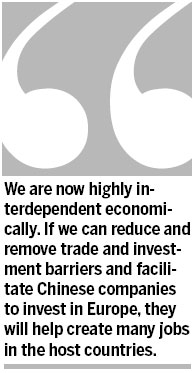
Economic interdependence of China and EU is the greatest reason for strengthening relations for mutual benefit
Editor's note: The China-Europe Dialogue, organized by China Daily and the Guan Tong Foundation, invites prominent Chinese and European leaders and experts to express their esteemed views and facilitate mutual understanding and trust. The latest dialogue of this year saw Zheng Bijian, chairman of China Institute of Innovation and Development Strategy, and Felipe Gonzalez, former prime minister of Spain, discussing the potential and benefits of strengthening Sino-European relations. The two articles that follow are summaries of their views.
China's rise is bound to be peaceful. Economic globalization has made possible China's peaceful rise. And the peaceful rise of China in turn has offered and will continue to offer the world opportunities and a market for mutual benefit and win-win progress.
In addition China needs to gradually enlarge the convergence of interests and build communities of interests with its neighbors and surrounding regions, as well as with all countries and regions. In the course of its peaceful rise, China can and must form with various countries and regions communities of interests in different fields and at different levels that cannot be easily broken up.
The reason for this is: In an era of globalization, our interests are so deeply intertwined that we are dependent on each other; the rise of non-traditional security threats has led to a new security concept based on cooperation among major countries; the international community has come to understand the necessity of joint efforts to address burning regional issues and maintain peace and security; and increasing contacts and cultural exchanges among people of different countries and regions have enhanced their mutual understanding.
Since the financial crisis broke out in 2008, especially in the second decade of this century, China and Europe both face enormous domestic challenges, challenges that are far more serious than external security threats. To cope with these challenges, I have proposed the strategic concept of expanding and deepening convergence of interests and building communities of interests.
For China, development and stability continue to top the agenda. At present, rising inflation rate, external pressure to revaluate the yuan, growing income disparity, real estate bubble and other problems call for urgent solution. In the longer term, economic restructuring, the advancement of science, technology and education, and improvement in social governance are the three tasks of fundamental significance that we have to fulfill.
Europe's greatest challenges do not come from outside the European Union, but from the need to make internal adjustments and carry out reform. The first priority for the EU now is to balance its budget, pay off its debt, resume growth and improve international competitiveness.
To meet our respective challenges, we all need a stable external environment, a gradual reform of the international system and a moderate approach to global governance. That is our common interest. In this context, if China and Europe both regard maintaining the stability of the other side and that of the international system as their greatest common interest, then the expanding of "convergence of interests" and the building of "communities of interests" will have a broad and solid foundation.
China is a major trade partner of the EU. We are now highly interdependent economically. If we can reduce and remove trade and investment barriers and facilitate Chinese companies to invest in Europe, they will help create many jobs in the host countries. Likewise, there are a lot of opportunities for European companies to invest in China. Also, intensifying consultation on future global currency system and financial regulation mechanism and advancing reform in these areas will go a long way in supporting balanced economic development in the world. That is also in our common interest.
China and Europe share many converging interests in other areas as well. China is one of the largest energy consumers, oil importers and carbon emitters in the world. Europe is a big oil importer, too, with imported oil expected to account for 70 percent of its consumption by 2030. Cooperation in clean energy will promote our economic development and scientific and technological innovation. Other areas where our interests converge include the cyberspace, the outer space and maritime security. All these areas are related to people's security and should be treated as "common land", where it is extremely necessary to establish public rules and operational procedures acceptable to relevant countries.
In non-traditional security areas, we also have common interests in maintaining stability in regions such as the Middle East, Central Asia and South Asia and combating terrorism.
Building communities of interest is a long-term task. In this process, disputes and differences may arise between China and the EU. For instance, China and the EU do not see eye to eye on issues of democracy, human rights and rule of law. That is only natural, because we have different political systems and values. Democracy represents the trend of the world, but it cannot be imposed from outside, nor can it be achieved through turmoil. The people of a country should decide their approach to human rights, democracy and rule of law in accordance with their national conditions.
But the basic factors and momentum to push forward the development of Sino-European relations in the next 10 years still exist. This requires us to seek new sources of growth in both bilateral and multilateral relations with a view to expanding and deepening our convergence of interests and building communities of interests, which will be beneficial to all parties.
The author is chairman of the China Institute of Innovation and Development Strategy, Beijing.
(China Daily 08/21/2012 page8)

Charlotte and Emilie Meaud, twin sisters, were killed at the terrace of the Carillon, during the attacks on Paris, on the 13th of November.